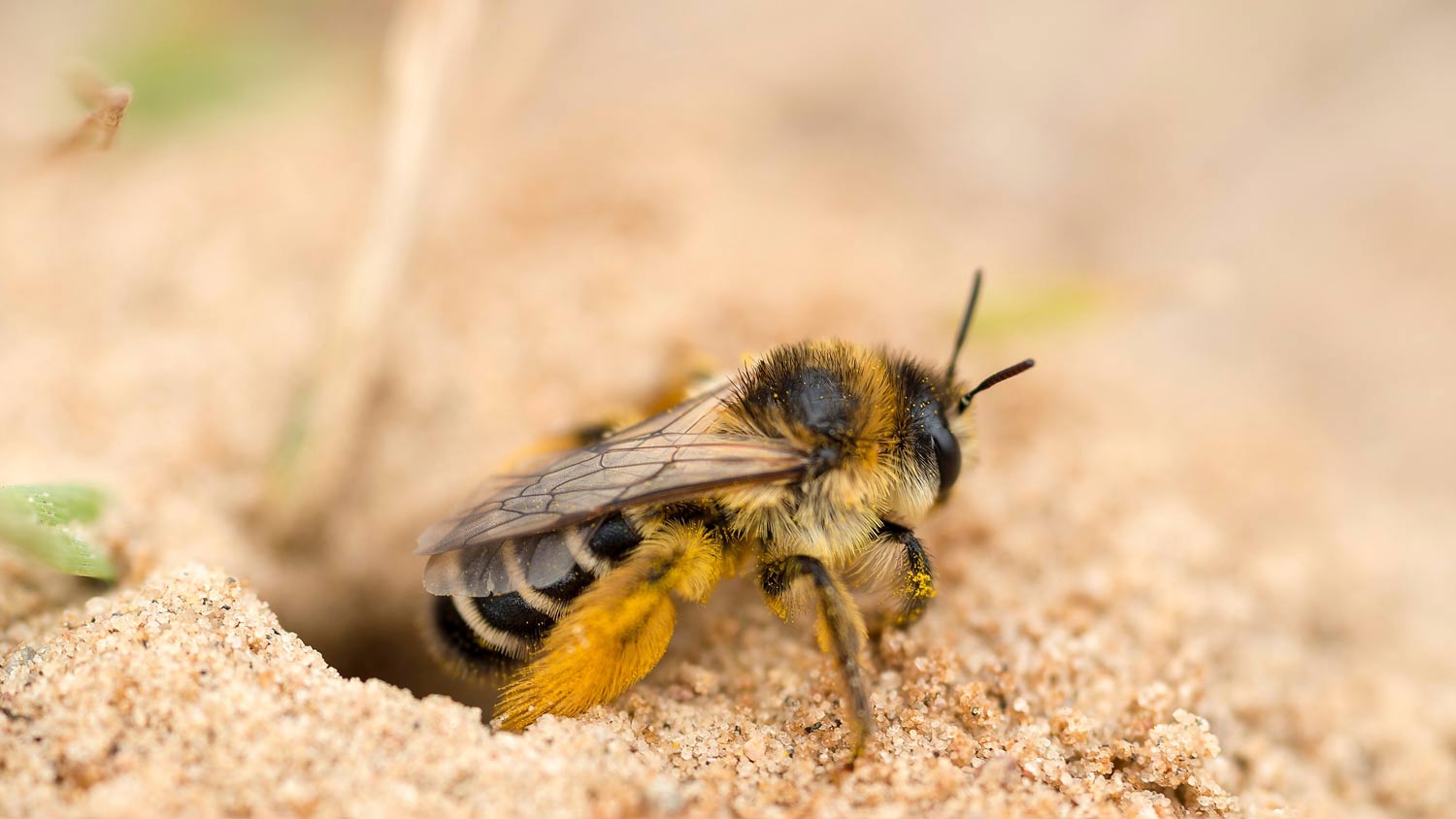
The average roach exterminator cost is between $100 and $600, depending on the species, infestation severity, and home size. Read on for a cost breakdown.
These groundbreaking removal methods are worth the buzz


If asked where bees live, many people would confidently say a hive. But 70% of bee species live underground, so you may need to learn how to get rid of ground bees. During the early spring, there’s a good chance that ground bees are nesting in your lawn.
Ground bees are generally harmless. However, in the event of a severe infestation, you may need to remove ground bees. Here are four simple removal methods and when to hire a bee control professional.

Commonly referred to as “ground bees,” ground-nesting bees are those that nest in the ground. While most people associate bees with hives, the majority of the world’s bee species breed colonies and live underground. Mason bees, mining bees, and leafcutter bees are just a few of the many types of ground bees.
Ground bees aren’t aggressive unless they feel threatened, and are only active for a few weeks each year. Ground bees play an essential role in pollination and help our ecosystem to thrive. So, only consider extermination if you’re allergic to bees or have a severe infestation on your hands.
On average, professional bee removal costs between $150 and $500. Depending on the severity of the infestation, it can cost up to $2,000 to remove ground bees. A bee removal expert will thoroughly assess your situation and provide a specific quote based on the best treatment plan.
Although ground bees spend most of their time below ground, there are ways to know if your yard is home to a ground nest. Ground bee nests are often found in sandy areas with well-drained soil and little vegetation. When trying to identify a ground nest, look for small mounds of dirt—you’ll likely see bees hovering close to the ground near the nests. You may even see several nests very close to one another if your lawn has ideal nesting conditions.
In most cases, taking measures to remove ground bees from your yard is unnecessary and can negatively impact the environment. That being said, the following DIY methods can be effective in eliminating ground bees. Refrain from DIY removal if you’re allergic to bees.
Insecticides are a convenient and effective way to exterminate ground bees. Keep in mind, though, that insecticides can harm other beneficial insects that live in the ecosystem. Insecticides can also pose a danger to pets and children that come in contact with them.
If you decide to use an insecticide, be sure to wear protective equipment and spray carefully according to the manufacturer’s instructions. Or consider hiring a local bee control pro to apply the incestide to ensure it’s done safely and effectively.
Using natural repellents can be an effective yet humane way to get rid of ground bees. Certain strong scents can naturally repel bees. Consider planting peppermint, eucalyptus, thyme, and similar plants in areas where ground bees tend to nest.
You can also try making your own homemade repellent using common household ingredients. Some have been successful using cinnamon or a solution of vinegar and water. For optimal results with natural repellents, cover the affected area generously every few days.
Dry soil is the ideal nesting place for ground bees. Flooding nests with water can kill existing ground bees and make the area uninhabitable for future nests. Use a sprinkler system, hose, or a bucket of water to saturate the nests. You may need to repeat the process every day until all of the ground bees are gone.
Ground bees are only active for a few weeks each year in the early spring. During this short but essential period, ground bees are gathering pollen and nectar to take back to their underground nests. In doing so, ground bees play a crucial part in plant reproduction. Often, the best way to get rid of ground bees is to be patient. Who knows? You might even grow to appreciate these industrious insects and all the good they do for our environment.

Before ground bees make themselves at home beneath your lawn, you can take preventative measures to discourage nesting. Consider implementing one or more of these prevention strategies.
Keeping your lawn hydrated can make it unappealing to ground bees looking for ideal nesting conditions. Moist soil makes it harder for ground bees to burrow deep holes, while providing minimal protection for eggs and larvae. Installing a sprinkler system is an effortless yet effective way to keep your lawn looking lush and drive ground bees away.
In addition to dry areas, ground bees look for sparse patches of land to create nests in. Planting thick grass in bare areas will make your lawn less appealing to ground bees. You can also deter bees by removing any rocks or bricks in your yard, as ground bees sometimes use them in place of burrows.
You can also fill in bare patches of your lawn with mulch or gravel to conceal nesting sites. Especially in high traffic areas where bees can be an annoyance, mulch can keep ground bees away while helping your lawn to retain moisture.
Ground bee queens are relatively docile and rarely sting. Male ground bees can be more aggressive but do not have a stinger which makes them harmless to humans. For this reason, hiring a professional may not be necessary unless you’re dealing with a severe infestation or you’re allergic to bees.
However, if you haven’t positively identified a ground bee or have a severe infestation, it’s best to hire a bee removal pro near you. A pro can confirm the presence of ground bees, locate all nests, and effectively treat the infestation while still being environmentally conscious.
From average costs to expert advice, get all the answers you need to get your job done.

The average roach exterminator cost is between $100 and $600, depending on the species, infestation severity, and home size. Read on for a cost breakdown.

Sometimes birds nest in unwelcome places. Find out how much bird nest removal will cost based on factors like location, bird species, and preventative measures.

Keep your home free of termites and the damage they do. Learn more about inspections, infestations, and the average cost of termite treatments.

Your pets may pick up fleas in the yard and spread them through the house. Learn how to get rid of fleas in your yard to treat the problem at its source.

Knowing when to call the exterminator is vital to getting your pest-free life back. Here are the signs you need to ditch the DIY tricks and call for help.

From the hooded skunk to the Eastern spotted skunk, learn how to identify common types of skunks you may see in your backyard or digging through your trash.